Raising Kids to Appreciate Unprocessed Food in a Character-Filled World
Oct 09, 2012

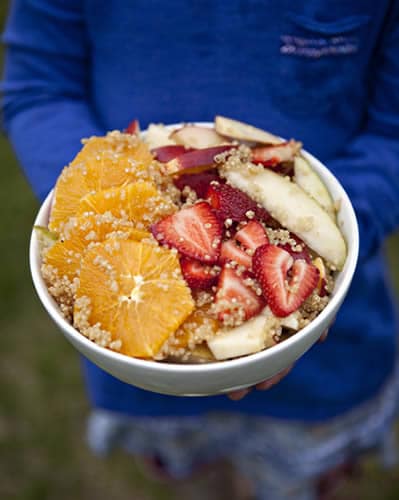
Eating good food can be difficult. We live in a processed society, and everywhere we walk we are bombarded not only by advertising, but by opportunity. There are drive-thrus, sure, but holiday dinners, potlucks, friendly invitations, or even just drinks with friends can prove difficult if you’re trying to eat whole foods. Add to this a few kids that you have to convince to shun Chester Cheetah, almost all food served at birthday parties, and brightly-colored cereal marshmallows and you definitely have your work cut out for you.
Before I begin, there are a few things you should know about me. I had kids when I was young, four by the time I was 27. This means that here as I enter my 30s I have a 12-year-old, and while my peers are having their first or second children, reveling in the newborn stage and learning the ins and outs of cloth diapering, I am focused on teaching my kids how to read, exploring algebra, deciding what age I allow my daughter to start reading novels with more adult content. It means that despite the fact that I look like I could be my kids’ sister (being shorter than my oldest helps), I am not. I am their mom, and together we are and have been navigating what it means to eat healthy in this processed world we live in for quite some time. Long enough that I feel like I have a few things to share about the successes and failures on my end.
Before I tell you what has worked for me I want to be clear: Your mileage may vary. Teaching kids to appreciate food is at least a thrice-daily ordeal. You have to approach the topic at once at each meal, sometimes more often. It’s definitely more of a way of life than a once-learned lesson, and it isn’t foolproof or perfect. My kids have all gone through stages of hating what we serve (usually ages 5 to 7 are the worst for this). Still, I view it as teaching my kids how to say “please” and “thank you.” There is plenty of repetition, behavior modeling, persistence, reminders, and finally, if you play your cards right, your children will start using it without your constant nagging.
1. Go Shopping.
I can’t tell you how many times I tell people that we visit the farmers market and the grocery store with all four of our kids. The color drains from people’s faces, and they either think we are insane or they give me an excuse as to why that’s a horrible idea. I am here to tell you it is not.
Taking my kids to the store helps them understand the food we’re eating. They see our produce in its true form, oftentimes before the dirt has been washed off. They know why we avoid artificial sweeteners, food dyes, HFCS and MSG, and they know how to look for them. It is the single most important lesson for them because they take those lessons away from the house and to their friends’ houses, when they start taking trips with their sports teams, and in the classroom. Maybe you don’t take your kids shopping every week, but try to make time in your schedule to expose them to the food you are eating at its beginnings.
2. Cook with Your Kids.
I am, in fact, suggesting you bring children into the scary environment that is the kitchen and relinquish control to small, inexperienced hands. As a Type-A perfectionist, I know that this can be difficult and stressful, but it is also very rewarding. My kids’ acceptance of new foods always goes more smoothly when they have been included on the shopping and the preparation. Start slow and build the skills your kids can help with. You would be surprised how much children can learn in a small amount of time, and teaching them a general respect for the kitchen and what goes on there is an invaluable skill. Check out my list of rough guidelines for ideas on how to get your kids excited and helping in the kitchen.
3. Eat Together.
With all the running around that we do, it can be difficult to carve out a dinnertime with the family. Still, research shows us important this step is in raising healthy and well-adjusted kids. Not only that, but watching what your kids are eating can help you understand their habits. For instance, I know that my four-year-old can take a while to get going, but once he does, he can be the best eater, not even considering foods he might not like and trying most everything without question. I know it’s his habit to drink a full glass of water and talk to everyone at the table before he ever takes the first bite most nights, and so I try not to rush him and give him his space to eat.
Knowing your children’s personal habits can help you understand if your kids eat one item at a time or all together, taking bites of each. It will help you see that all food habits are not avoidance, and this can be invaluable when introducing new foods. Plus, showing them how you eat is a great way to model what you’d like to see them do.
No time during the week? Make time on Saturdays and Sundays or give weekday breakfasts a go. There is always time for the things we place importance on.
4. Be Willing to Bend the Rules.
Remember that your kids are people, too. There are times when I allow myself dessert, pieces of chocolate, cocktails, and other indulgences. The sheer nostalgia associated with certain foods has me eating them on those special occasions where I’m presented with them, and I can do so without guilt because I know that the other 97.5% of the time I am eating a different way.
Barring any allergies or medical issues, try not to ban your children from foods forever. For my kids, they know the what and why we avoid things, and they’re content to play by those rules. I do, however, make exceptions, and we talk about the exceptions. When my then 6-year-old overdosed on Halloween candy, we talked about how crummy he felt afterward and why, explaining the effects sugar can have on the body. Now when my kids find themselves with a plethora of treats, they are quick to tell me how they’re going to eat some and save the rest for a treat for a different time. Are they likely to overindulge again? Of course. We’ll just explain the sentiment again and continue onward.
5. Enjoy Your Food.
So, we don’t buy the Ding Dongs and bags of cheese-powder-coated chips or the fun yogurt with the sprinkles, the soda in effervescent colors. Rather than fighting about why not, we discuss, and still there are issues. This is where it becomes important to celebrate the things we do eat that are fun and that taste good. My kids have an appreciation for honey sticks from the farmers market. We all get excited when we make the trip to our local artisan ice cream shop where the room smells like freshly baked waffle cones. When we buy candy we go all out, and we savor small bites and make them last for days and weeks. Baking a cake is a family affair, and the anticipation is sometimes better than the act of eating it. Taking time to appreciate those moments and activities helps us to truly understand the value of them rather than just tossing a box of individually packed snack cakes in the cart without a second thought.
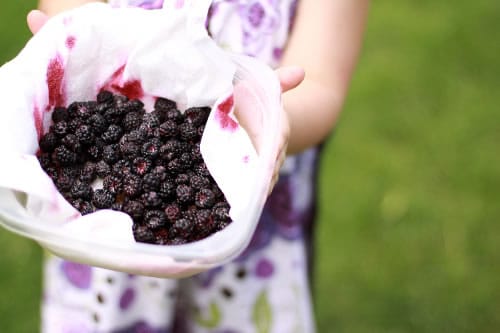
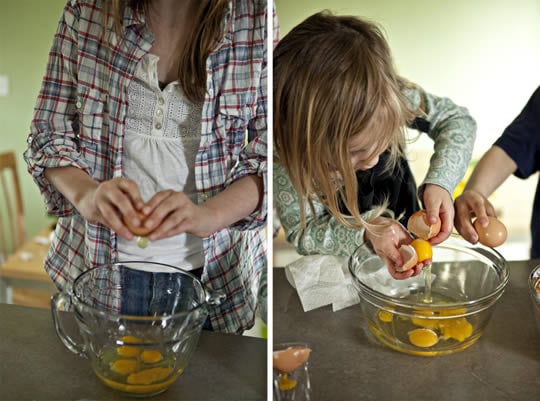


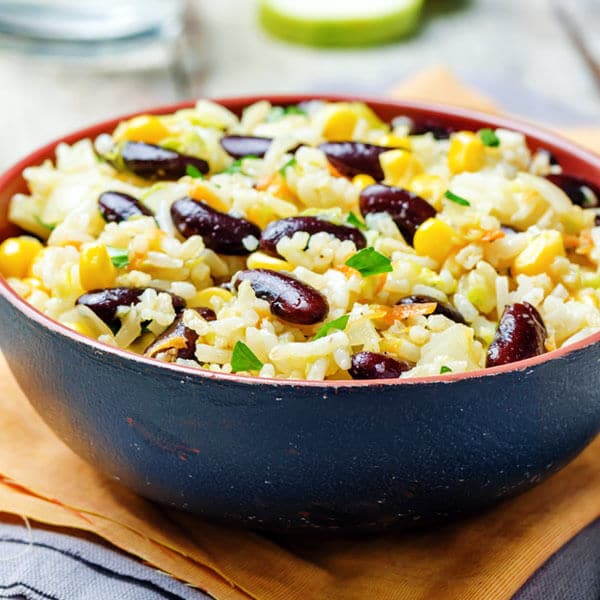
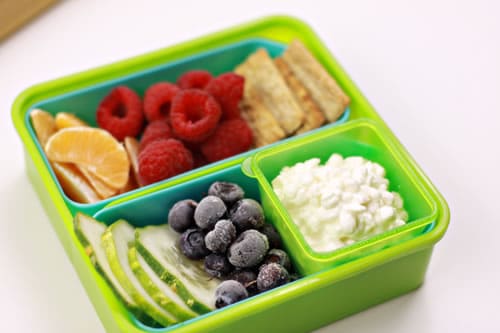
















great post! it’s such an uphill battle with school snacks and birthday parties and playdates and so frustrating that more parents don’t care what their children eat but hopefully if i continue to teach my now 4 year old she will be choose healthy foods herself when she’s older.
WONDERFUL post!! I built a wonderful preschool where the children gardened organically and we served no white products (rice, flour, bread, sugar), preservatives, colorings or other junk. Elders told me I was abusing the children by not giving them sugar. They had all the treats any other child did the were just made with healthy ingredients. There are tons of great cookbooks using honey, maple syrup, etc. Many times parents would come to find their children eating raw broccoli, asparagus, carrots and other food from the garden and not believe it was their child. There was also a LOT of support at meal times for eating well (“Yum! Broccoli!) and teachers were not allowed to share their negative opinions on whole foods. It makes such a difference to health for life to start out well and not let the kids get hooked on fast foods. I know it can be… Read more »
This is so ‘on time’! My mom visited this weekend and she told me how she grew up on a farm and ate whole foods and watched her grandmother cook which as years went by turned my mother into a good cook! She still has those wonderful memories and she is 71! I too remember cooking with my mother! My mother took me to the store. I watched her talk with the butchers, produce guy and the farms we visited…it taught me how to pick food! A foundation!
These are all important tips. We’ve never ‘banned’ son from having anything – but he saw as we shopped, read labels, prepared fresh, real food from whole ingredients at home. He asked questions and we answered “why are we getting this one instead of that one?” We made information available to him in whatever form he chose (like a colorful nutrition wall poster from greenleafy). Now, he’s 14 and prefers homemade whole wheat pizza to commercial (has turned it down at social events) and can take one square of chocolate and leave the rest for later. For that matter, he’s been known to put aside a favorite donut ‘for later’ and sit down to a plate of broccoli, brown rice, and grilled salmon. Something that was important when taking him grocery shopping was not so much talking ‘at’ him about things but rather talking to myself out loud, letting him… Read more »
This is exactly what I work with my clients, who are parents on. I do not have kids myself, but have been a teacher of the younger children. Nutrition and health is always incorporated into my classroom, and now as a weight loss coach it’s moved on to parents. However, I am shortly going to have a 6 year old…skipping the young stages which I had prepared for. I know I can incorporate some of my classroom skills with him, but he has lived in an interesting food choice environment. Does anyone have any tips for this situation?
“Teaching kids to appreciate food is at least a thrice-daily ordeal.”
I can attest to that. In the past 9 days of this challenge my boys and I have had countless discussion centered around whole foods. Most of the time it is positive!
Thanks for the excellent post, Shaina.
I love this! Number 4 & 5 are really great. This post is full of encouragement and inspiration. I love that it Shaina doesn’t talk down to me. I don’t get a tone at all like I’m a bad mother or the feeling of guilt. I’ve slowly found the whole food lifestyle. My husband had to go gluten free couple years ago so my kids are used to learning what’s in food. Now I did a complete food lifestyle makeover in February. I am slowly teaching the kids about eating foods without sugar, salt & all the other crap that gets put into processed foods. I do employ #4 & 5 with them. Preparing unprocessed foods can be challenging for me since I’m very kitchen challenged so the food tends to be plain & the same things all the time. My next goal is to try to get to Farmers… Read more »
Thank you so much, Tina. I truly appreciate you saying that. I understand not being skilled in the kitchen. I grew up with a mom who hated the kitchen, but who cooked from scratch daily – the same seven meals week in and week out. Still, it made me appreciate the importance of eating good food, even when it was sometimes boring food. Stick with it. The more you cook, the easier experimenting becomes.
I love this post. I am in the same situation–my oldest was born when I was 21. When kids eat unprocessed foods every day at home and talk about the food they eat, they learn that most important life lesson. We always attribute much of our extraordinary good health to the way we eat, and that helps us make good food choices. And yes–I take all 4 with me to the store. As they get older, we split the list and shop in half the time! It’s wonderful.
I love this post! I’m not a mom (yet), but this can totally apply to adults as well (aka my roommates). Gotta start small, explain, discuss, and include! And when I DO have children, I’ll remember this for them! Thanks Shaina 🙂
I really think that last point, of enjoying food, is so important. Then kids (and adults!) don’t feel like they’re missing out on something. And they will hopefully come to enjoy the homemade treats and find the processed ones distasteful.
I completely agree, Shereen. I know Andrew has commented on how he lost his taste for different processed foods after October Unprocessed. The same goes for kids, too. I find my kids won’t eat the frosting on cake at birthday parties because it’s too sweet compared to what they’re used to eating.